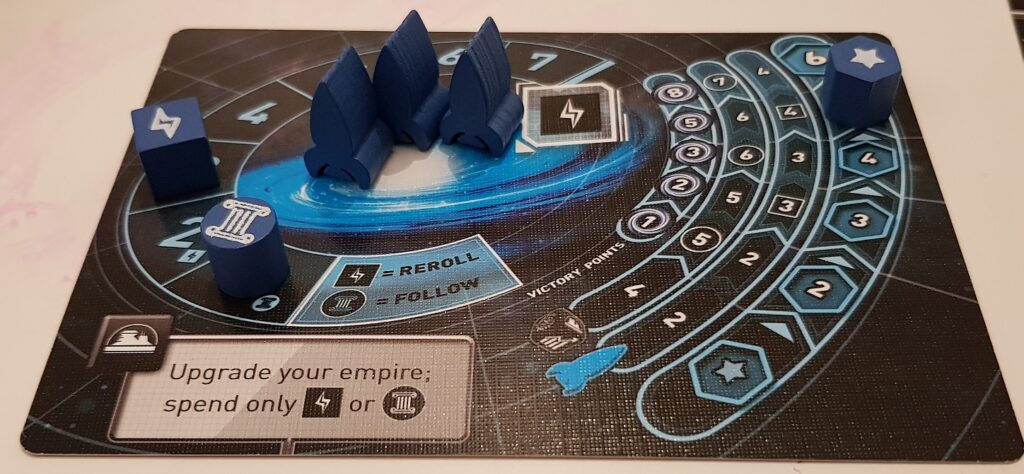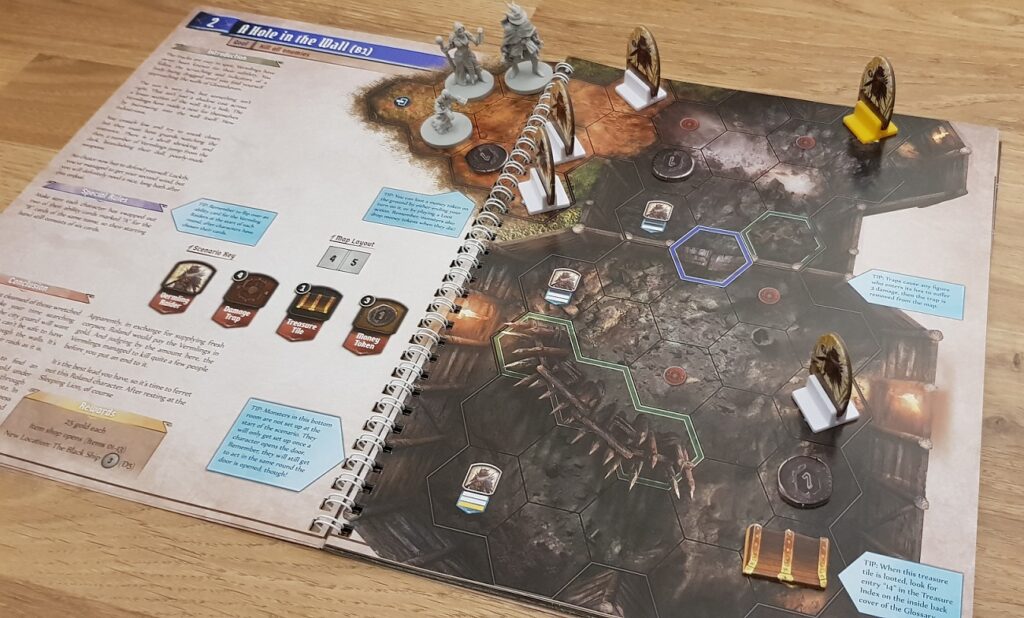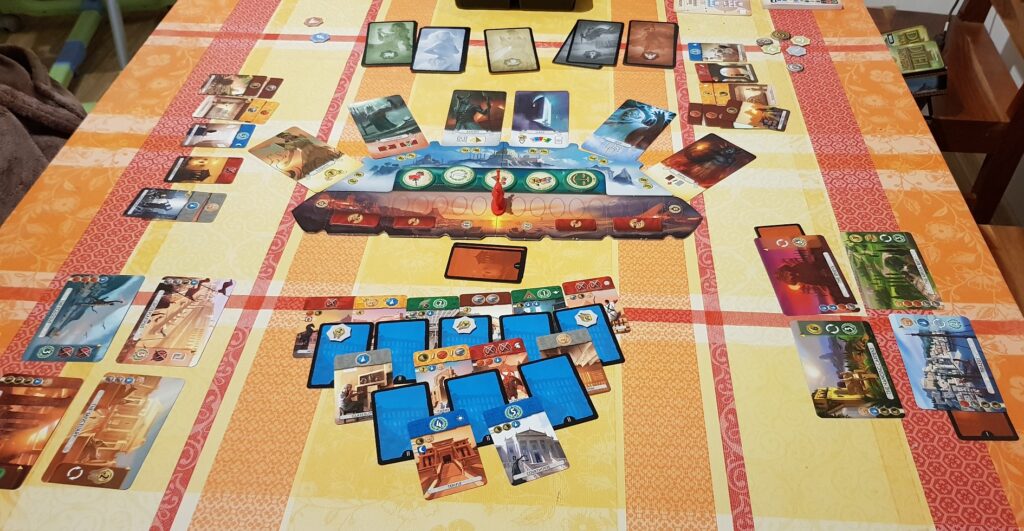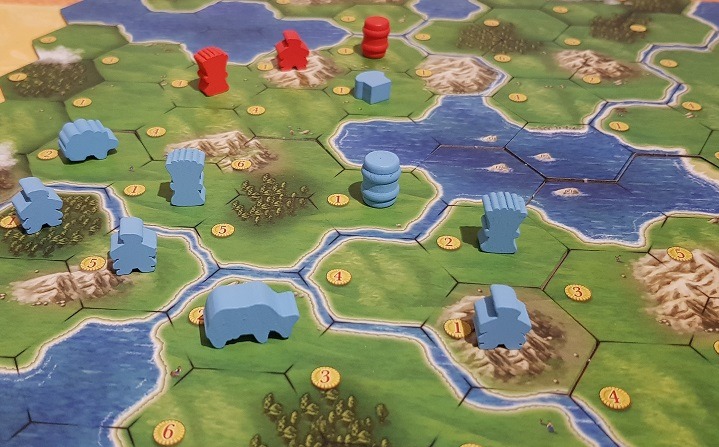Nowadays plenty of entertainment forms exist. TV programs, movies, YouTube, Netflix, video games; if we start with indoor activities. Then you have all sorts of outdoor activities: workout, sports, shows, museums, the list is endless. Why should you choose board games over others or at least dedicate a significant portion of your time to them? Why is it good to play board games?
1. Board games are a good workout for both the mind and body
Board games are a modern version of Sudoku or crosswords – a workout for your mind. They require the practice of critical thinking, managing resources, and planning while having the luxury of being in a safe space.
Games like Mage Knight demand a lot of mathematical and logical thinking. You’ll be doing small to medium scale algebraic equations in your mind, juggling with numbers, and trying to adjust your decisions to maximize results.
Other games like train-themed board games require financial skills: budgeting your capital for your infrastructure, investing, speculating on shares, and managing your stocks.
Cooperative gameplay is a very popular trend in modern board gaming. It means that you play against the game and work together with other players, instead of against them. A game like Robinson Crusoe teaches you to solve problems and plan moves together to work towards a common goal. You win or lose as a team, there’s no middle way.
There is a clear health benefit to playing board games: keeping your mind sharp reduces the risk of Alzheimer’s disease. Playing releases endorphins (the happiness hormone), and reduces blood pressure and stress levels.
Long term, playing board games will make you happier, smarter, and healthier. Of course, doing sports and having an all-around healthy diet is even better for you. As with everything in life – a decent balance of all things is needed.

2. They are one of the best socializing tools
The first thing you do in the morning – and the last thing you do before going to sleep is to check your phone. You’re staring at screens at work and home, losing touch with the physical world. Even for entertainment purposes, you watch movies, TV shows, or play video games.
Board games offer a different, “retro” approach. You can see the components in front of you, touch them, and interact with them and the people around you in a more natural, “analog” way. It’s a breeze of fresh air in our digitalized present and a way to stay connected to the physical world.
A large part of board gaming is playing with other people. They are great to break the ice and bonding if you are at a gathering with total strangers. Cooperative games shine here, as they force you to socialize, to come out of your shell. It gives people with social anxiety a solid reason to stop being shy, while still staying in their comfort zone.
And if you take them to a party, they can take it to the next level, providing the extra factor (alcohol or no alcohol included), that gets people relaxed and talkative. Sharing mutual experiences is one of the best ways to connect with other people.

3. Board games can save relationships
You both come home after a long day at work, then spend another couple of hours taking care of the kids and putting them to bed and by the time you should focus on each other, you’re too tired to interact and become couch potatoes. What if you would play a board game instead?
It doesn’t have to be anything long or heavy – a short half-hour simple game will lighten the mood, make you interact with each other, laugh, and plan together. You and your partner will show sides you fell in love in the first place and instead of drifting apart, you keep falling in love over and over again.
Here are games, that are very good for strengthening a relationship.
4. Board games are an excellent tool for learning about winning and losing in life
Board games teach you how to better cope with the ups and downs in life. You learn that your actions have consequences. It’s your job to make the best of your decisions and take responsibility for the consequences.
You learn how to deal with losing. And you learn that it doesn’t matter if you lose, as long as you did your best. That’s the most you can do – if an unlucky dice roll then destroys your plans, it’s not your fault. Do not worry about a factor you have no influence over.
Parallel to this: it’s about the journey, not the destination. Having fun is not conditioned with winning – it’s about playing, making decisions, interacting with others, and immersing. That’s where the joy is. I am a very competitive person and I like winning just like anybody, but some of my most memorable plays are from losing: cranking that difficulty in Pandemic to the maximum or trying to beat my uncle in chess over and over again (and failing).
Board games don’t reward impulsive reckless behavior. You will become calmer, more methodical, and more patient. Waiting for your opponent to act, while contemplating your moves, you drift into a zen-like state, where there’s nothing in the world, except the game, here and now.
You begin to appreciate the games for the challenge they offer and respect them and other players more. After the game, you will get up with your head smiling, congratulating your opponent, regardless of the results.

5. They are a way to experience new things and educate
It’s not a secret that board games can broaden your horizons. While a lot of them are fantasy-themed (with some real adventures to be found there), you also have a lot drawing their theme from real-world people and events. They allow you to experience parts of history or events (like being a Viking) that you would otherwise have little chance to experience.
Just like a good book, video game, or movie, they can make you experience a new world firsthand, just as if you were there. Would you like to experience how it is to be Frodo? How about Sauron?
You can learn a lot about slavery from a game like Freedom: Underground Railroad or about the Cold War from Twilight Struggle. But where they succeed is in fostering your interest in the subject matter. You’ll find yourself searching for more information on the internet, watching documentaries and TV shows about it. You never know, you might even read a book.
6. Board games offer excellent value for money
I know what you’re thinking. How can those $100 boxes be reasonable? Building a repertoire of games can get expensive and you can reach $1000 worth without filling even a fraction of your shelf space.
Sure, if you’re just hoarding games and not playing. But build your collection gradually, actually spend the time playing the games (divide those $100 into 50 hours of gameplay and it’s suddenly not at all expensive) so you get the maximum value out of them.
Take good care of your games. Unlike similarly-priced video games, board games have a big advantage: they can be re-sold for a good portion of their retail price. So don’t be afraid to experiment with your collection and try different games. If you don’t like them, just sell them.
Let’s not forget about some Kickstarter exclusives, games out of print, or vintage games. You can sell those for much more than you spent on them. Investing in such games is a hobby in itself. Purchase wisely (don’t buy every junk you see) and you could make nice money out of a hobby.
You can even play board games alone. Sometimes you just can’t go through the process of setting up and organizing a social event. Luckily, plenty of board games are suitable for such solo occasions (see my lists of solo board games) and they have some clear advantages over video games, being a lot more engaging (you have to use your whole brain to immerse yourself, strategize and run the game, while video games do a lot of those things for your, leaving your brain under-stimulated).

Final thoughts on Why Is It Good To Play Board Games
As you can see, board games are an excellent way to spend your leisure time. But, as with other things, don’t fall into the trap of overdoing it. Board game communities are full of pictures of shelves, filled with board games (they call them “shelfies”). Some collections go into hundreds of titles.
I can’t help to ask myself how many of those games made it to the table. And how many of those received the gameplay time they require and deserve? I get my answer when I see a lot of those games still wrapped in plastic. But if you can afford that, it’s your money after all.
Don’t take games too seriously. Have fun, but remember what the priorities in life are.
Why are Board Games Bad? – 8 Reasons
Do you like what you just read? Consider subscribing for more content:

Hey there!
I agree. Board games connect people and make them a part of social interactions. When I was a kid, we played monopoly all the time and I have one of the best memories looking back at this. Maybe not even board games, but also something like Jenga , where you need to move objects to defeat your competitor. Awsome.
Jenga is considered a board game as well. It falls into “dexterity” category. We played it a lot, but unfortunately I don’t have the most steady hand. 🙂
I’ve always had a flare for indoor board games due to the fact that they motivate you to think better and build better. I like the way you were able to highlight individually the benefits of board games thereby stimulating one to trying it out if he/ she haven’t. Thumbs up for a nice article.
They motivate you to keep improving, especially if there is someone sitting on the other side of the tale that you would really love to defeat, but always seem to come jut a tad short. 🙂
I like the way you put it, a breeze of fresh air in or digitalized present world. Spending our leisure without educating our minds have become a thing of the past. Every one now appreciate silent education passed to the subconscious. Games like Sudoku, board game are essential to help sharpen the mind and are beneficial to both the mind and the body
Active spending of your free time has become the norm these days. Mindless fun like TV or drinking is considered redundant.
Thanks for this interesting article, I never thought about so many benefits of playing board games. I have many happy memories of playing board games at Christmas and other family get together.
That is probably the biggest advantage over computer games, as the latter will never create great memories of social gatherings. Although you can play computer games with others, it is only in a virtual way, and therefore isn’t the same.
I prefer to read books rather than use electronic readers, and I think this is a similar thing to choosing board games over computer games. Having a physical item that you can touch and look after means more than something that isn’t really in front of you. Thanks for sharing this.
I agree with touching the components and interacting with other players behind the table. It makes board games a much more memorable experience compared to video games. (While the latter can present a much more complex world.)